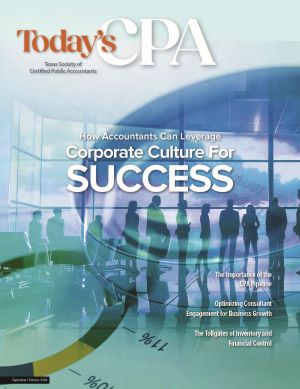September 01, 2024
SEC Adopts Climate-Related Disclosures
After a Two-Year Lag, the SEC Adopts the Disclosures, Albeit with Significant Modifications, and then Puts Them on Ice
By Don Carpenter, MSAcc/CPA
After almost two years, the SEC issued final rules in March for climate-related disclosures. The rules represent a significant curtailing of the requirements in the proposed regulations. But nevertheless, registrants reacted immediately. Just a month later, on April 4, the SEC issued a stay in spite of the fact that they do not become effective until 2026. With a pending review in the U.S. 8th Circuit Court of Appeals, the SEC stated that the purpose of the stay is to avoid regulatory uncertainty until the court hears the matter.
In March 2022, the SEC released proposed disclosure requirements for climate-related matters that met with a firestorm of objection. (See “SEC Proposes Controversial Rules Requiring Climate-Related Disclosures” in the May/June 2022 issue of Today’s CPA.) The proposed rules resulted in more than 24,000 comment letters. Although the final rules, which come in at over 880 pages, offer scaled back requirements, the controversy seems far from over.
Within days, 10 Republican-led states filed suit to block the rules. And the Sierra Club filed its own suit asserting that the requirements in the final version remove information that the organization deems necessary to manage its investments. In short, the SEC finds itself between the proverbial “rock and a hard place.”
The most controversial requirement in the 2022 draft made it incumbent on reporting entities to quantify and disclose Scope 1, 2 and 3 greenhouse gas emission metrics (GHG) in a footnote to the financial statements.
At a March meeting, commissioners passed by a three to two vote the final rules that retain the Scope 1 and 2 GHG disclosures but drop the requirement that Scope 3 GHG must also be included. Scope 3 includes upstream sources of GHG, such as suppliers and business travel, as well as from downstream uses of the entities’ products by customers.
In the discussion section of the final rules addressing consistency, comparability and reliability, the SEC noted commenters’ concerns that subjectivity of emission metrics could lead to a lack of comparability between registrants. Although not requiring a specific standard or methodology, the commission highlighted the Task Force on Climate-Related Disclosures Framework and the requirements promulgated by the International Sustainability Standards Board of the IFRS Foundation, which have been adopted by several major trading partners as accepted approaches to GHG reporting.
The SEC retained many of its disclosure requirements embedded in the 2022 proposal, including:
- The impact of identified climate-related risks on the registrant’s business and financial statements;
- The impact these risks are likely to have on the entity’s strategy and outlook;
- Actions taken by the entity to mitigate risk or adjust to identified risks; and
- Information regarding the entity’s climate-related goals or targets.
For large-accelerated filers, disclosure begins in fiscal year 2025 with Scope 1 and 2 GHG added in 2026. However, assurance is not required on the GHG metrics until 2029 when limited assurance must be performed, which is replaced with reasonable assurance in 2033.
Accelerated filers begin disclosure one year later, but Scope 1 and Scope 2 GHG are not required until 2028 with limited assurance in 2031. Accelerated filers are not required to provide reasonable assurance.
All other reporting entities, including non-accelerated filers, emerging growth companies and small reporting companies, begin disclosure in 2027 and are not required to disclose Scope 1 and Scope 2 GHG metrics at all.
The phased-in assurance requirements may cause some confusion among readers and will likely require modification to the auditor’s opinion letter. The phased-in assurance requirements highlight that all review work is not alike. For 2026 – 2028, large- accelerated filers do not need auditor review of the Scope 1 and Scope 2 metrics even though the information is reported in footnote format, which are typically covered by the auditor’s opinion. Limited assurance is then required for the ensuing two years.
Limited assurance relies more heavily on management representations and requires less substantive review and a lower reliance on internal controls.
Although no assurance is absolute, reasonable assurance is the auditor’s view that the information is materially correct, akin to the standard in a traditional auditor’s opinion letter. The SEC estimates that the reporting requirements will increase compliance and professional service costs by about $200,000 per large-accelerated filer. The disclosures mark a departure from the information that readers of Form 10-Ks have been accustomed to seeing. Assuming these requirements stand the challenges they face, it will be incumbent on users of the financial reports to understand the context of this new information, the analysis that goes into the quantifications and the level of assurance that is given by the reporting entity’s attest firm.
As is evident from the volume of comment letters received by the SEC, there is heightened concern not only with these requirements but with what this might portend for future rules. The rules have been criticized as administrative overreach requiring registrants to provide information in response to socio-political objectives rather than provide insight into their financial results. It remains to be seen how the courts will rule.

In the interim, companies are well advised to begin planning for implementation and reporting.
About the Author: Don Carpenter, MSAcc/CPA, is clinical professor of accounting at Baylor University. Contact him at Don_Carpenter@baylor.edu.
Essential Takeaways You Need to Know The SEC’s new climate-disclosure rules will impact how companies report greenhouse gas emissions and manage compliance in the coming years. Insights include the following takeaways. The SEC's Final Rules: The SEC issued final rules in March for climate-related disclosures, which significantly scaled back the requirements from the proposed 2022 regulations. Despite this, the SEC issued a stay pending review in the U.S. 8th Circuit Court of Appeals. Controversy Over Scope 3 Emissions: The most contentious issue in the 2022 draft was the requirement for companies to disclose Scope 1, 2 and 3 greenhouse gas (GHG) emissions. The final rules retained only Scope 1 and 2 disclosures, dropping the Scope 3 requirement. Legal Challenges: The rules face lawsuits from both Republican-led states and environmental groups like the Sierra Club. Phased Implementation and Assurance Requirements: The rules have a phased implementation timeline, with large-accelerated filers beginning disclosure in 2025. Assurance on GHG metrics is phased in, starting with limited assurance in 2029 and reasonable assurance in 2033. Concerns About Future Regulations: The final rules have raised concerns about potential future regulations, with critics arguing that the SEC's requirements may be more about socio-political objectives than financial transparency. |
Thanks to the Sponsors of Today's CPA Magazine
This content was made possible by the sponsors of this issue of Today's CPA Magazine:






















